九年级英语Unit10You’resupposedtoshakehandsSectionA(1a_2d)教案(新版)人教新目标版
九年级英语上册unit10知识要点
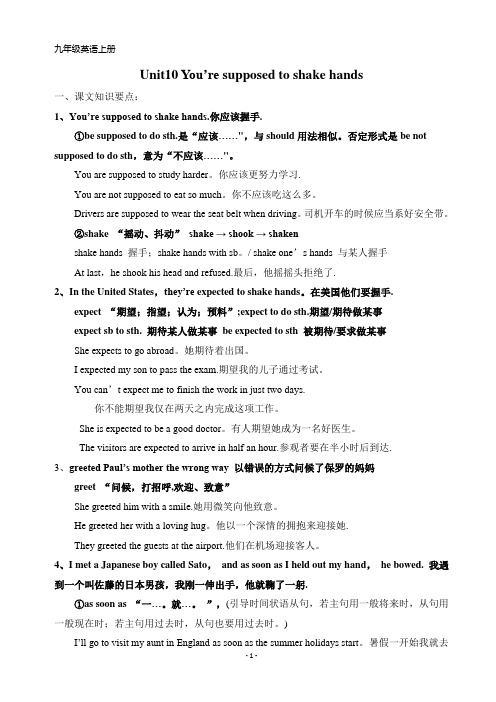
九年级英语上册Unit10 You’re supposed to shake hands一、课文知识要点:1、You’re supposed to shake hands.你应该握手.①be supposed to do sth.是“应该……",与should用法相似。
否定形式是be not supposed to do sth,意为“不应该……"。
You are supposed to study harder。
你应该更努力学习.You are not supposed to eat so much。
你不应该吃这么多。
Drivers are supposed to wear the seat belt when driving。
司机开车的时候应当系好安全带。
②shake “摇动、抖动”shake → shook → shakenshake hands 握手;shake hands with sb。
/ shake one’s hands 与某人握手At last,he shook his head and refused.最后,他摇摇头拒绝了.2、In the United States,they’re expected to shake hands。
在美国他们要握手.expect “期望;指望;认为;预料”;expect to do sth.期望/期待做某事expect sb to sth. 期待某人做某事be expected to sth 被期待/要求做某事She expects to go abroad。
她期待着出国。
I expected my son to pass the exam.期望我的儿子通过考试。
You can’t expect me to finish the work in just two days.你不能期望我仅在两天之内完成这项工作。
She is expected to be a good doctor。
九年级英语全册 Unit 10 You’re supposed to shake hands Sec
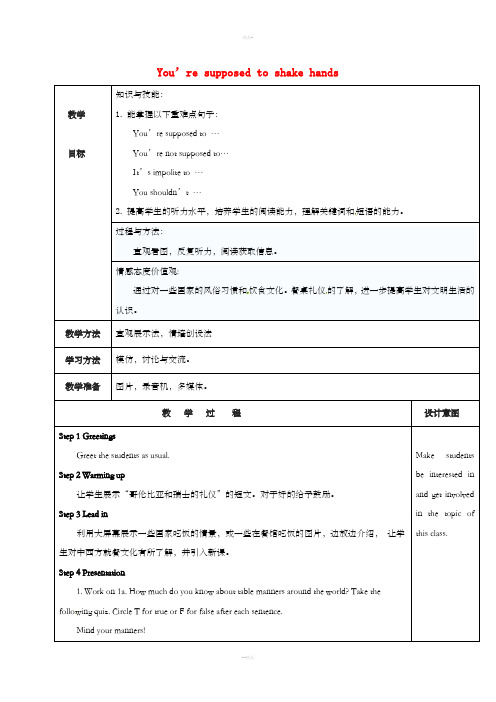
You’re supposed to shake hands教学目标知识与技能:1.能掌握以下重难点句子:You’re supposed to …You’re not supposed to…It’s impolite to …You shouldn’t …2.提高学生的听力水平,培养学生的阅读能力,理解关键词和短语的能力。
过程与方法:直观看图,反复听力,阅读获取信息。
情感态度价值观:通过对一些国家的风俗习惯和饮食文化。
餐桌礼仪的了解,进一步提高学生对文明生活的认识。
教学方法直观展示法,情境创设法学习方法模仿,讨论与交流。
教学准备图片,录音机,多媒体。
教学过程设计意图Step 1 GreetingsGreet the students as usual.Step 2 Warming up让学生展示“哥伦比亚和瑞士的礼仪”的短文。
对于好的给予鼓励。
Step 3 Lead in利用大屏幕展示一些国家吃饭的情景,或一些在餐馆吃饭的图片,边放边介绍,让学生对中西方就餐文化有所了解,并引入新课。
Step 4 Presentation1. Work on 1a. How much do you know about table manners around the world? Take the following quiz. Circle T for true or F for false after each sentence.Mind your manners!Make students be interested in and get involved in the topic of this class.1. In India, you’re supposed to eat with your hands. T F2. In China, you’re not supposed to stick your chopsticks into the food. T F3. In Korea, the youngest person is expected to start eating first. T F4. In France, you’re supposed to put your bread on the table. T F5. In China, it’s impolite to use your chopsticks to hit an empty bowl. T F1)先让学生自己做,老师指导,让他们理解每个句子的意思。
人教版九年级英语《Unit 10 You’re supposed to shake hands. 》
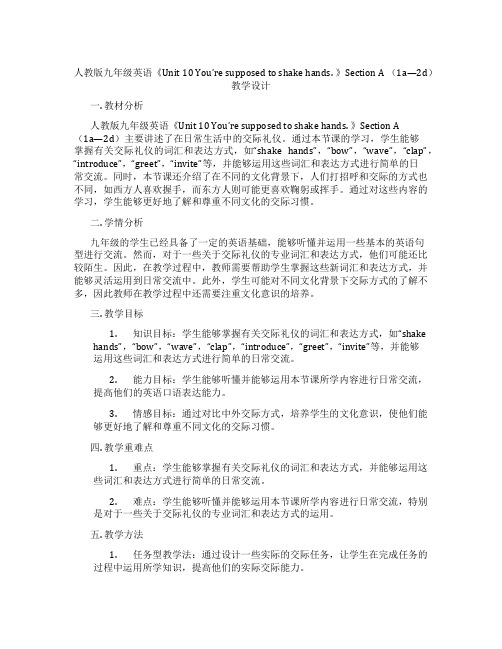
人教版九年级英语《Unit 10 You’re supposed to shake hands. 》Section A (1a—2d)教学设计一. 教材分析人教版九年级英语《Unit 10 You’re supposed to shake hands. 》Section A(1a—2d)主要讲述了在日常生活中的交际礼仪。
通过本节课的学习,学生能够掌握有关交际礼仪的词汇和表达方式,如“shake hands”,“bow”,“wave”,“clap”,“introduce”,“greet”,“invite”等,并能够运用这些词汇和表达方式进行简单的日常交流。
同时,本节课还介绍了在不同的文化背景下,人们打招呼和交际的方式也不同,如西方人喜欢握手,而东方人则可能更喜欢鞠躬或挥手。
通过对这些内容的学习,学生能够更好地了解和尊重不同文化的交际习惯。
二. 学情分析九年级的学生已经具备了一定的英语基础,能够听懂并运用一些基本的英语句型进行交流。
然而,对于一些关于交际礼仪的专业词汇和表达方式,他们可能还比较陌生。
因此,在教学过程中,教师需要帮助学生掌握这些新词汇和表达方式,并能够灵活运用到日常交流中。
此外,学生可能对不同文化背景下交际方式的了解不多,因此教师在教学过程中还需要注重文化意识的培养。
三. 教学目标1.知识目标:学生能够掌握有关交际礼仪的词汇和表达方式,如“shakehands”,“bow”,“wave”,“clap”,“introduce”,“greet”,“invite”等,并能够运用这些词汇和表达方式进行简单的日常交流。
2.能力目标:学生能够听懂并能够运用本节课所学内容进行日常交流,提高他们的英语口语表达能力。
3.情感目标:通过对比中外交际方式,培养学生的文化意识,使他们能够更好地了解和尊重不同文化的交际习惯。
四. 教学重难点1.重点:学生能够掌握有关交际礼仪的词汇和表达方式,并能够运用这些词汇和表达方式进行简单的日常交流。
人教九年级英语全册口头翻译精练Unit10You'resupposedtoshakehands完美

You’re supposed to shake hands. (1)
This information comes from Yang Xuehui at Shili high school in Xihe, Gansu.
在你们国家,第一次遇见某人时你 们应该干什么?
In your country, what are you supposed to do when you meet someone for the first time?
昨晚在保尔家那顿宴请怎么样?
How was the dinner at Paul’s house last night?
嗯,挺不错,不过我出了些差错。
Well, it was OK, but I made some mistakes.
我本应该七点抵达,
I was supposed to arrive 7:00,
我也和你一样。
I did the same thing.
我伸出手,而令我惊讶的是,
I held out my hand and to my surprise,
她亲吻了我的面颊!
she kissed me on both s有介意那样!
I wouldn’t mind that!
Where I’m from, we’re pretty relaxed about time.
我们不喜欢匆匆忙忙地生活,
We don’t like to rush around,
所以我们不介意别人偶尔迟到一会 儿。
so we don’t mind if people are a little late sometimes.
我们应该握手。
初中英语九年级 Unit 10 You’re supposed to shake hands

Present:Reading skill 2: Sometimes you should analyse(分析) the information
Then present the vocabulary
Ss read the paragraph and answer the questions.
Match the phrase with their meanings:
go out of one’s way; becomfortable speaking; worry
The teacher introduce an exchange student Lin Yue.And ask Ss to guess which country she studies, and what her challenges are.
Guess the riddle.
Think about: What challenges will an exchange student have?
学生分析
前一节课通过听力和对话练习,了解了中国和其它国家的一些餐桌礼仪,学生对法国的餐桌礼仪还知之甚少,有了解的欲望和兴趣;学生的推理判断、概括总结的阅读理解能力一直是弱项,需要不断练习和培养。
教学目标
1.To learn some vocabulary: except, worry, go out of one’s way, be comfortable doing , gradually get used toby reading the passage;
九年级英语Unit10You’resupposedtoshakehands.课文重难点知识点详细讲解[1]解读
![九年级英语Unit10You’resupposedtoshakehands.课文重难点知识点详细讲解[1]解读](https://img.taocdn.com/s3/m/6ec6289ed4d8d15abe234ee6.png)
Unit10 You’re supposed to shake hands.Section A1.In your country, what are you supposed to do when you meet someone for the first time?在你们国家,当你第一次见到某人的时候你应该做什么?【解析】be supposed to do sth 被期望做某事,应该做......1)当主语是人时,表示劝告、建议、责任等,=should =“to be expected to do sth,You are supposed to___________( arrive) on time2)当主语是物时,表示“本应;本该”The train was supposed to arrive half an hour ago.【拓展】:be supposed to 与should(1)be supposed是suppose一词的___________ 语态结构。
后接动词不定式,相当于___________ .后接不定式.即:_______________ . 使用较随便,建议性强否定式为be not supposed to do sth.()To keep safe, drivers aren’t supposed to drink before driving.A. aren’t willing toB. shouldn’tC. aren’t sure toD. don’t have to(2)should后接动词______ ,属于_______ 语态形式,使用起来较严肃和正式;You are not supposed to shake hands. = You shouldn’t shake hands.你不应与之握手。
【2012贵州贵阳】“Henry, you ______ tell the teacher if you want to go out of the classroom.”“Sorry, sir.”A. are supposed toB. are surprised toC. are afraid to【2013山东菏泽】8. You are _____to type quickly when talking to each other on QQ so the other person doesn't get bored A. suggested B. supportedC. taughtD. Supposed【2013黑龙江绥化】29. You are supposed to ________ smoking, ________ you will get ill.A. go on; soB. give up; or C stop; so【2014黔西南州】27. The students ought to wear school uniforms when they’re at school.A. are supposed toB. are allowed toC. would like toD. love to 【2014云南昆明】29. We are supposed to ___________a solution to stop people from looking down at their mobile phones while driving cars.A. come up withB. come formC. come outD. come true 【解析2】for the first time 首先,第一次【辨析】at first/first of all(1) at first = at the beginning 最初,开始【强调在时间顺序或做某事过程等开始之初】(2) first of all 首先,第一【表明陈述事情的重要性】( ) When you want to work for our country in the future, ____, we should have strong body and rich knowledge.A. at firstB. first of allC. for the first timeD. after all【山东德州】We can do a lot to stay healthy. ____ , we should eat a balanced(平衡的) diet.A. At a timeB. In factC. First of allD. All together【有关time的短语】A. firstB. oneC. onceD. firstly【2014贵州六盘水】24. Children always have a good time at the Wetland Park(湿地公园) of Liu Panshui.A. enjoy themselvesB. help each otherC. look beautifulD. have a big dinner()② People in China ________when they meet for the first time.A. bowB. kissC. shake handsD. laugh【新疆】You’re supposed to shake ______ (hand) when you meet your friends.( ) ②—Do you think our football team will win the match? —Yes, we have better players. so I ___them to win.A. hopeB. askC. helpD. expect【2013山东青岛】14. — You look sad. What has happened? —Everyone ______ us to win the match, but we lost.A. expectsB. expectedC. hopesD. Hoped【2013 湖北黄冈】30. Speak slowly, Mr. Wang. I can’t follow you.D. expect希望全班同学参加讨论。
Unit10Youresupposedtoshakehands原文与翻译
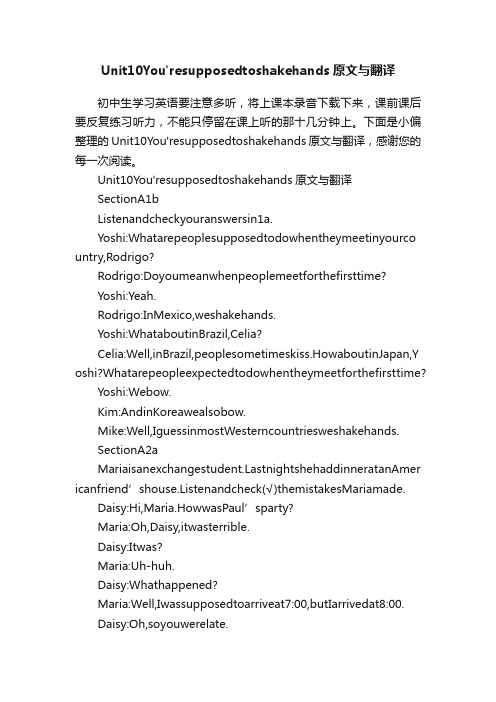
Unit10You'resupposedtoshakehands原文与翻译初中生学习英语要注意多听,将上课本录音下载下来,课前课后要反复练习听力,不能只停留在课上听的那十几分钟上。
下面是小偏整理的Unit10You'resupposedtoshakehands原文与翻译,感谢您的每一次阅读。
Unit10You'resupposedtoshakehands原文与翻译SectionA1bListenandcheckyouranswersin1a.Yoshi:Whatarepeoplesupposedtodowhentheymeetinyourco untry,Rodrigo?Rodrigo:Doyoumeanwhenpeoplemeetforthefirsttime?Yoshi:Yeah.Rodrigo:InMexico,weshakehands.Yoshi:WhataboutinBrazil,Celia?Celia:Well,inBrazil,peoplesometimeskiss.HowaboutinJapan,Y oshi?Whatarepeopleexpectedtodowhentheymeetforthefirsttime?Yoshi:Webow.Kim:AndinKoreawealsobow.Mike:Well,IguessinmostWesterncountriesweshakehands.SectionA2astnightshehaddinneratanAmer icanfriend’shouse.Listenandcheck(√)themistakesMariamade.Daisy:Hi,Maria.HowwasPaul’sparty?Maria:Oh,Daisy,itwasterrible.Daisy:Itwas?Maria:Uh-huh.Daisy:Whathappened?Maria:Well,Iwassupposedtoarriveat7:00,butIarrivedat8:00.Daisy:Oh,soyouwerelate.Maria:Yeah,butinmycountry,it’sdifferent.Whenyou’reinvit edfor7:00,you’reexpectedtocomelater!It’sconsideredstranget oturnupontime.Daisy:Isee.Maria:ThenwhenImetPaul’smom,Ikissedher.Daisy:Oh…youweresupposedtoshakehandsinstead.Maria:That’sright.AndIworeafanc ydress.Daisy:What’swrongwiththat?Maria:Well,itturnedoutthatitwasanoutdoorparty,Daisy.Every oneelsewasinaT-shirtandjeans.Daisy:Iguessnexttimeyoushouldaskwhatyou’resupposedto wear.SectionA2bListenagain.Fillintheblanks.Daisy:Hi,Maria.HowwasPaul’sparty?Maria:Oh,Daisy,itwasterrible.Daisy:Itwas?Maria:Uh-huh.Daisy:Whathappened?Maria:Well,Iwassupposedtoarriveat7:00,butIarrivedat8:00.Daisy:Oh,soyouwerelate.Maria:Yeah,butinmycountry,it’sdifferent.Whenyou’reinvit edfor7:00,you’reexpectedtocomelater!It’sconsi deredstranget oturnupontime.Daisy:Isee.Maria:ThenwhenImetPaul’smom,Ikissedher.Daisy:Oh…youweresupposedtoshakehandsinstead.Maria:That’sright.AndIworeafancydress.Daisy:What’swrongwiththat?Maria:Well,itturnedoutthatitwasanoutdoorparty,Daisy.EveryoneelsewasinaT-shirtandjeans.Daisy:Iguessnexttimeyoushouldaskwhatyou’resupposedto wear.SectionA2dRoleplaytheconversation.Howwasthewelcomepartyforforeignstudentslastnight?Great!Imadesomenewfriends.Butafunnythinghappened.What?ImetaJapaneseboycalledSato,andassoonasIheldoutmyhand, hebowed.That'showpeopleinJapanareexpectedtogreeteachother.It'sim politeifyoudon'tbow.Ididn'tknowthat.SoIjuststoodtherewithmyhandout.Finally,Ire turnedthebow.IrememberwhenlfirstmetMarielastyear,Ididthesamething.Ihe ldoutmyhandandtomysurprise,shekissedmeonbothsidesofmyfac e!Iwouldn'tmindthat!terlfoundoutFrenchpeoplearesupposedtokissw hentheyseeeachother.SectionA3aReadthefollowingopinionsofaColombianandaSwissstudent.I nwhichcountryisitOKtobe15minuteslatefordinner?TeresaLopezCall.ColomblaWhereI’mfrom,we’reprettyrelaxedabouttime.Wedon’tlik etorusharound,sowedon’tmindifpeoplearealittlelatesometimes.Ifyoutellafriendyou’regoingtotheirhousefordinner,it’sOKif youarriveabitlate.Weliketoenjoyourtimeslowly.Wevaluethetimew espendwithourfamilyandfriendsinoureverydaylives.Weoftenjustdropbyourfriendshomesifwehavetime.Wedon’tusuallyhavetomakeplanstomeetourfriends.Whenweseeeachoth er,it’spoliteforboystoshakehandsandforgirlstokisseachotheront hesideoftheface.Weoftenjustwalkaroundthetowncenter,seeingasmanyofourfr iendsaswecan!Marcleblanclausanne.SwitzerlandInSwitzerland,it’sveryimportanttobeontime.We’rethecapi talofclocksandwatches,afterall!Ifsomeoneinvitesyoutomeethimo rheratnoon,thenyou’reexpectedtobethereatnoon.Ifyou’reeven15minuteslate,y ourfriendmaygetmad.SoImake anefforttobeontimewhenImeetmyfriends.Ialwaysleavethehousee arlytoavoidheavytrafficbecauseIthinkit’simpolitetokeepothersw aiting.Also,wenevervisitafriend’shousewithoutcallingfirst.Wealmo stalwaysmakeplanstoseefriends.Weusuallyplantodosomethingin teresting,orgosomewheretogether.SectionB1bSteveisgoingtoChinatostudy.HisfriendYangMingistellinghim aboutthetablemannersinChina.Listenandnumberthepicturesinth eorderyouhearthem.YangMing:YoumustbeexcitedaboutleavingforChinatomorro w,Steve!Steve:Yeah,butI’malittlenervous,too.YangMing:Why?Steve:Well,foronething,Idon’tknowhowtousechopsticksver ywell…andIdon’tknowhowtobehaveatthedinnertable.YangMing:Oh,Isee.Well,oneimportantthingisthatyou’renots upposedtostarteatingfirstifthereareolderpeopleatthetable.Steve:That’sinteresting.IntheUnitedStates,itdoesn’tmatter.YangMing:Yeah,Iknow.It’salsoimpolitetostickyourchopsticksintoyourfood.Youshouldn’tpointatanyonewithyourchopsticks, either.Steve:Oh,OK.YangMing:Oh,andthere’sonemorethingyouneedtoknow.Yo u’renotsupposedtotalkwhenyou’reeatingdinner.Onlyparentsa reexpectedtotalkatthedinnertable.Childrenarenotallowedtospea k.Steve:Wow!That’s…that’sunusual!YangMing:Haha,I’mjustkidding!SectionB1cListenagain.Matchthesesentenceparts.YangMing:YoumustbeexcitedaboutleavingforChinatomorro w,Steve!Steve:Yeah,butI’malittlenervous,too.YangMing:Why?Steve:Well,foronething,Idon’tknowhowtousechopsticksver ywell…andIdon’tknowhowtobehaveatthedinnertable.YangMing:Oh,Isee.Well,oneimportantthingisthatyou’renots upposedtostarteatingfirstifthereareolderpeopleatthetable.Steve:That’sinteresting.IntheUnitedStates,itdoesn’tmatter.YangMing:Yeah,Iknow.It’salsoimpolitetostickyourchopstick sintoyourfood.Youshouldn’tpo intatanyonewithyourchopsticks, either.Steve:Oh,OK.YangMing:Oh,andthere’sonemorethingyouneedtoknow.Yo u’renotsupposedtotalkwhenyou’reeatingdinner.Onlyparentsa reexpectedtotalkatthedinnertable.Childrenarenotallowedtospea k.Steve:Wow!That’s…that’sunusual!Yang Ming:Haha,I’mjustkidding!Readtheletterandanswerthequestions.DearLaura,Thanksforyourmessage.Yes,I’mhavingagreattimeonmystudentexchangeprograminFrance.IwasabitnervousbeforeIar rivedhere,buttherewasnoreasontobe.Myhostfamilyisreallynice.Th eygooutoftheirwaytomakemefeelathome.Thegrandmotherknow sthatImissChinesefoodalot.SosheactuallylearnedhowtomakeChi nesefood!Shealsohasateenagegranddaughteraboutmyagewhois reallykind.ShealwaystalkstomeinFrenchtohelpmepractice.Youwo uldn’tbelievehowquicklymyFrenchhasimprovedbecauseofthat.I’mverycomfortablespeakingFrenchnow.AlthoughIstillmak elotsofmistakes,itdoesn’tworrymeasitusedto.Mybiggestchallengeislearninghowtobehaveatthedinnertabl e.Asyoucanimagine,thingsareverydifferentfromthewaytheyareat home.Forexample,you’renotsupposedtoputyourbreadonyourpl ate.You’resupposedtoputitonthetable!Ithoughtthatwasprettyst rangeatfirst,butnowI’musedtoit.Anotherexampl eisthatyou’renotsupposedtoeatanythingwit hyourhandsexceptbread,notevenfruit.Youhavetocutitupandeatit withafolk.Anotherthingisthatitisimpolitetosayyou’refull.Ifyoudo n’twantanymorefood,youshouldjustsay,“Thatwasdelicious.”Al so,you’renotsupposedtoputyourelbowson thetable.Ihavetosayt hatIfinditdifficulttoremembereverything,butI’mgraduallygettingusedtoit.Idon’tfindFrenchcustoms sostrangeanymore,I’llwriteagainsoonandtellyoumoreaboutmylifeinFrance.Hopeyou’rehavingagoodschoolyear.Yours,LinYue翻译:凯蒂:昨晚为留学生举办的欢迎派对怎么样?约翰:真棒!我交了一些新朋友,不过发生了一件很有趣的事情。
初中英语九年级 Unit 10 You’re supposed to shake hands. Se

初中英语九年级Unit 10 You’re supposed to shake hands. Section B 2a-2e 教学设计一. 教材分析本课选自人教版英语九年级Unit 10 You’re supposed to shake hands. Section B 2a-2e。
本节课主要介绍了不同文化背景下的礼仪差异,通过对话形式展示了在不同的场合如何正确地使用礼仪。
教材内容丰富,贴近学生生活,能激发学生的学习兴趣,培养学生的跨文化交际意识。
二. 学情分析九年级的学生已经具备了一定的英语基础,能够听、说、读、写一些简单的英语句子。
但部分学生对英语学习仍存在恐惧心理,不敢开口说英语。
此外,学生对不同文化背景下的礼仪差异了解不多,需要在本课中进行引导和培养。
三. 教学目标1.知识目标:–能听懂、会说、会读本节课的生词和短语。
–能正确运用情态动词和被动语态描述不同文化背景下的礼仪差异。
2.能力目标:–能用英语进行简单的跨文化交际。
–能通过合作学习,提高自己的语言运用能力。
3.情感目标:–培养学生的跨文化交际意识,尊重不同国家的礼仪。
–增强学生的团队协作精神,提高学生学习英语的兴趣。
四. 教学重难点•掌握本节课的生词和短语。
•运用情态动词和被动语态描述不同文化背景下的礼仪差异。
•正确运用情态动词和被动语态进行跨文化交际。
•理解并运用英语表达各种礼仪场合的正确方式。
五. 教学方法1.任务型教学法:通过设定各种任务,让学生在实践中学习英语,提高语言运用能力。
2.情境教学法:创设各种真实的语境,让学生在交流中掌握英语知识。
3.合作学习法:引导学生分组讨论,培养团队协作精神,提高学习效果。
六. 教学准备1.准备本节课所需的课件、教案、录音带等教学资料。
2.准备与本课相关的水果、礼物等实物,用于展示和练习。
3.提前让学生预习本节课的生词和短语,了解基本的文化背景知识。
七. 教学过程1.导入(5分钟)–教师通过展示不同国家的礼仪图片,引导学生谈论各自对礼仪的认识,激发学生的学习兴趣。
九年级英语 Unit10 You 're supposed to shake hands
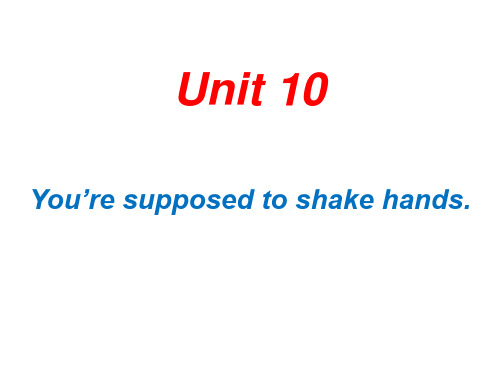
This is secret and I’m not supposed to talk about it. 这是秘密,我不应该谈论。
She is late for class again and she is supposed to say sorry to the teacher.
她又迟到了, 她应该向老师说对不起。
Listening Maria’s mistake
Maria’s mistake ___arrived late ___ate wrong food ___greeted Paul’s mother the
wrong way ___wore the wrong clothes
Maria: I supposed to_a_r_r_i_v_e_a_t_7_:_0_0___, but I arrived at 8:00.
Where are they from? Is it important to be on time in their countries?
Pairwork
Role play a conversation between Teresa and Marc. Talk about the different attitudes in Colombia and Switzerland.
F 2.In Peru, you are not supposed to talk at the table.
F 3.In China, you’re not supposed to pick up your bowl of rice.
F 4.In Korea, the youngest person is supposed to start eating first.
九年级英语Unit10-You're-supposed-to-shake-hands.课文重难点知识点详细讲解
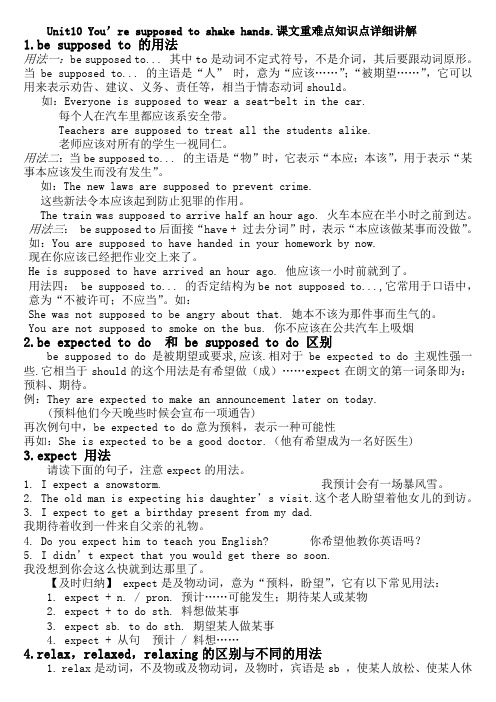
Unit10 You’re supposed to shake hands.课文重难点知识点详细讲解1.be supposed to 的用法用法一:be supposed to... 其中to是动词不定式符号,不是介词,其后要跟动词原形。
当be supposed to... 的主语是“人”时,意为“应该……”;“被期望……”,它可以用来表示劝告、建议、义务、责任等,相当于情态动词should。
如:Everyone is supposed to wear a seat-belt in the car.每个人在汽车里都应该系安全带。
Teachers are supposed to treat all the students alike.老师应该对所有的学生一视同仁。
用法二:当be supposed to... 的主语是“物”时,它表示“本应;本该”,用于表示“某事本应该发生而没有发生”。
如:The new laws are supposed to prevent crime.这些新法令本应该起到防止犯罪的作用。
The train was supposed to arrive half an hour ago. 火车本应在半小时之前到达。
用法三: be supposed to后面接“have + 过去分词”时,表示“本应该做某事而没做”。
如:You are supposed to have handed in your homework by now.现在你应该已经把作业交上来了。
He is supposed to have arrived an hour ago. 他应该一小时前就到了。
用法四: be supposed to... 的否定结构为be not supposed to...,它常用于口语中,意为“不被许可;不应当”。
如:She was not supposed to be angry about that. 她本不该为那件事而生气的。
Unit10You'resupposedtoshakehands.知识梳理人教版英语九年级全册

Unit 10 You're supposed to shake hands.短语归纳1.首次;初次____________________2.(与某人)握手___________________3.……怎么样/如何____________________4.以错误的方式;错误地____________5.一……就……____________________6.伸出(手等)________________________________________ 8.发现;找出;查明_________________ ____________________ 10.顺便拜访;顺便进入_____________11.在……的两边____________________ 12.在某人的日常生活中_____________ 13.尽可能……____________________ 14.准时,按时____________________ 15.……的首都/国都____________________ 16.在中午____________________ 17.大动肝火;气愤____________________ 18.有趣的事情________________________________________ 20把……擦掉____________________21.脱下(衣服);(飞机等)起飞________________22.餐桌礼仪____________________ 23.把……插入……____________________ 24.指着____________________指向____________________ 指出____________________25.因……而感谢____________________ 因……而感谢某人____________________26.玩得高兴,过得愉快_________________ 27.使(某人)感到宾至如归______________________________ 29.因为;由于____________________30.最初;首先____________________ (反:最后;终于____________________)____________________ 32.像____________________ 33.出席;露面____________________ ____________________35.毕竟;终归________________________________________38.和……不同____________________ (反:和……相同____________________)____________________40.对……感到放松/随意___________________Section A风俗习惯1)custom〔名词〕风俗;习俗The customs are different from country to country.I don't like the custom of giving presents in that country.The Japanese customs are different from the Chinese ones.Nailbiting is one of her bad habits.2.bow 鞠躬bow①〔不及物动词〕鞠躬bow to/before...向……鞠躬The speaker bowed to/before the listeners.②〔及物动词〕低(头)She bowed her head.③〔名词〕鞠躬(读作/bau/);弓(读作/bəu/)The Japanese usually take a bow while greeting.He made his son a bow.3.shake hands 握手shake hands 握手其中shake(shook,shaken) 既可用作及物动词,也可用作不及物动词,意为“摇动;抖动”。
- 1、下载文档前请自行甄别文档内容的完整性,平台不提供额外的编辑、内容补充、找答案等附加服务。
- 2、"仅部分预览"的文档,不可在线预览部分如存在完整性等问题,可反馈申请退款(可完整预览的文档不适用该条件!)。
- 3、如文档侵犯您的权益,请联系客服反馈,我们会尽快为您处理(人工客服工作时间:9:00-18:30)。
教学目标 知识与 技能 过程与 方法 情感态 度与价 值观 重点 be supposed to 的用法 1) 能掌握以下单词: custom, bow, kiss, greet, be supposed to, 2)掌握 be supposed to 句型的用法。 1. 训练读写能力 2. 强化在短文中理解词汇的能力 1. 学习一些见面礼仪,生活习俗和对时间的看法。 2. 了解西方国家的风土人情和习俗。
明确目标
阅读提纲,
Let's go for a swim.) 让我们去游 泳吧。 suppose 的其他用法: ③.suppose + that 引导的宾语从 句“假设,猜想,以为”。例如:I suppose that she'll be there
today. 我想她今天能到那里。 ④. 当 suppose + that 引导的宾 从变为否定句时,否定应前移,有此 种用法的词有 think , believe , guess(猜想)等。例如: I suppose that she will come to your party. → I don't suppose that she will come to your party .我猜她 不会来参加你的晚会。 ⑤. 在表示同意或不同意别人的观 点时,常用“I suppose so/ I don't suppose so”。 ---Will he be back this weekend? 他周末会回来吗? --- Yes , I suppose so .我想他会 回来。 【备课例句】 We all suppose that he will fail the exam.我们都认为他会考试不及 格。 2. That’s how people in Japan are expected to greet each other. greet =to welcome or say “hello” 动词 “问候,打招呼” e.g. He greeted her by saying “good morning”. 他向她打招呼说 “早上好”。 She greeted me with a friendly smile. 她向我微笑致意。
学生活动
二次备课
2、出示学习目标 1) 能掌握以下单词: custom, bow, kiss, greet, be supposed to, 2)掌握 be supposed to 句型的用法。 3、 出示自学提纲 1)sectionA1b,2a,2b 听力训练 2)2c make conversations 3)Role play with partner in 2d 4)Language points 1. What are you supposed to do when you meet someone for the first time?当你第一次遇到某人时,你应 当怎样做? suppose 的基本意思是“猜想; 以为; 假定”,但在具体的语言环境中意义 不止于此,其用法如下: ① . suppose + 名 词 / 代 词 + to be...,表示“认为…是…”。如: Many people suppose him to be over 50. 许多人认为他已经 50 多岁了。 ② . suppose 用于祈使句中,表示 “让……”。如: Suppose we go for a swim. (=
4、组织学生自学 指导学生阅读并回答问题。 二、自学反馈 汇报或检测 以小组为单位自主学习,并汇报自学 成果 回答老师提出的问题
三、质疑精讲
1、学生质疑,师生共同解疑 2、教师横向拓展和纵向挖掘 一: be supposed to... 其中 to 是 动词不定式符号,不是介词,其后要 跟动词原形。当 be supposed to... 的主语是“人” 时,意为“应 该…… ”;“被期望……”,它可 以用来表示劝告、建议、义务、责任 等 , 相 当 于 情 态 动 词 should 。 如: Everyone is supposed to wear a seat-belt in the car. 每个人在 汽车里都应该系安全带。 二:当 be supposed to... 的主语是 “物”时,它表示“本应;本该”, 用于表示“某事本应该发生而没有 发生”。 如:The new laws are supposed to prevent crime. 这些新法令本应该 起到防止犯罪的作用。 三: be supposed to 后面接“have + 过去分词”时,表示“本应该做某 事而没做”。如:You are supposed to have handed in your homework
提出质疑,师生共同解决 聆听、思考、回答
by now.现在你应该已经把作 业交上来了。 四: be supposed to... 的否定结 构为 be not supposed to ..., 它常 用于口语中,意为“不被许可;不应 当”。 如 : She was not supposed to be angry about that. 她本不该为那 件事而生气的。 四、总结提高 1、出示精选习题 一、单项选择。 1. — When am I supposed to arrive? — You're ____ arrive at 7:00 if you're invited for 7:00. A.important to to C. expected to D. expect to B.suppose 根据所学内容解答习题
难点
中西方人们见面礼仪的差别。 培养学生跨文化交际意识。
教法、学法 教学准备 教学流程 一、自主学习
引导、启发 小黑板 录音机
பைடு நூலகம்
自主学习、合作交流
课型
新授课
教师活动 1、知识回顾 Lead-in 师生讨论: 学生在学校应该做哪些 事情?引出新句型。 如 :Is it a good idea to come to class late? S: No. T: That’s right. It’s not a good idea to come late. You’re not supposed to come to class late. You’re supposed to … eat in class, do homework every day, raise your hand before talking 等做更多的练习,引出 be supposed to 句型 回忆
